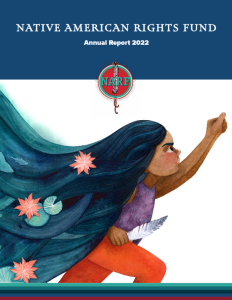
The NARF 2022 Annual Report is now available!
The annual report is an opportunity to see how your donations are paying off as an investment in justice. The report covers projects and case development from the past year and is organized by NARF’s five guiding principles:
1. Preserve tribal existence
2. Protect tribal natural resources
3. Promote Native American human rights
4. Hold governments accountable to Native Americans
5. Develop Indian law and educate the public about Indian rights, laws, and issues
In addition to NARF’s work, this year’s report features Michaela Sheiteen Goade (Tlingit and Haida Indian Tribes of Alaska), a Caldecott Medalist and #1 New York Times bestselling author-illustrator of books for children. We hope you can take a moment and check out the report!
From the Report: Executive Director’s Report
2022 was the fifty-second year that the Native American Rights Fund has been serving as the national Indian legal defense fund providing legal advice and assistance to tribes, Native organizations, and individual Indians in cases of major importance across the country. Once again, we were proud that we were able to help our Native American clients achieve several significant legal victories and accomplishments during the year.
In Big Horn Electrical Cooperative v. Alden Big Man, the Ninth Circuit Court of Appeals upheld Crow tribal court jurisdiction over a non-member utility company for failure to follow tribal law limiting service disconnections during winter months for elderly and disabled residents. The court held that the Crow Tribe, represented by NARF, has legislative jurisdiction over the cooperative on the tribal trust land where Mr. Big Man, an elderly tribal member, resides.
NARF represented the Hualapai Tribe of Arizona in applying for the transfer into trust status of eight parcels of land. Three parcels were taken into trust since 2018. The Hualapai Tribe Water Rights Settlement Act of 2022 added the other five parcels to the Hualapai Reservation.
The Akiachak Native Community, the Chilkoot Indian Association, the Chalkyitsik Village Council, and the Tuluksak Native Community, represented by NARF, successfully litigated that land could be taken into trust for Alaska tribes. However, the Trump Administration withdrew support for land-into-trust for Alaska tribes. The Biden Administration issued a 2022 Solicitor’s Opinion confirming Interior Department’s authority to take land into trust for Alaska tribes.
In United States v. State of Alaska, the Association of Village Council Presidents and two subsistence users, represented by NARF, intervened on the side of the United States to stop Alaska from interfering with federal law’s preference for subsistence users along the Kuskokwim River. The court enjoined Alaska from opening the river to fishing by all Alaska resident because it would harm the subsistence users given the ongoing salmon crash.
NARF serves as co-counsel for a Native student, in Waln v. Dysart School District, who sued her Arizona school district for violating her religious freedom rights to wear an eagle feather at graduation. The U.S. District Court ruled against the student, but the Ninth Circuit Court of Appeals overturned that ruling and remanded the case back to the district court.
In the Ninth Circuit Court of Appeals, NARF represented the National Indian Education Association, Tribal Education Departments National Assembly, American Indian Higher Education Association, and National Congress of American Indians as amici curiae in support of the students at Havasupai Elementary School, a K-8 school in Arizona operated by the Bureau of Indian Education. The students allege that the Bureau failed its duty to provide basic special and general education. Special education claims were settled, but the court dismissed the general education claims. The Ninth Circuit reversed that dismissal and returned the case to the district court.
In Western Native Voice v. Jacobsen, NARF represented the Blackfeet Nation, Confederated Salish and Kootenai Tribes of the Flathead Reservation, Fort Belknap Indian Community, and the Northern Cheyenne Tribe. It challenged two discriminatory Montana voting laws. One ended same-day voter registration, the other blocked organized ballot collection, both of which are used heavily by reservation voters. The court ruled in favor of the Tribes, finding evidence of racial discrimination.

John E. Echohawk
Executive Director


